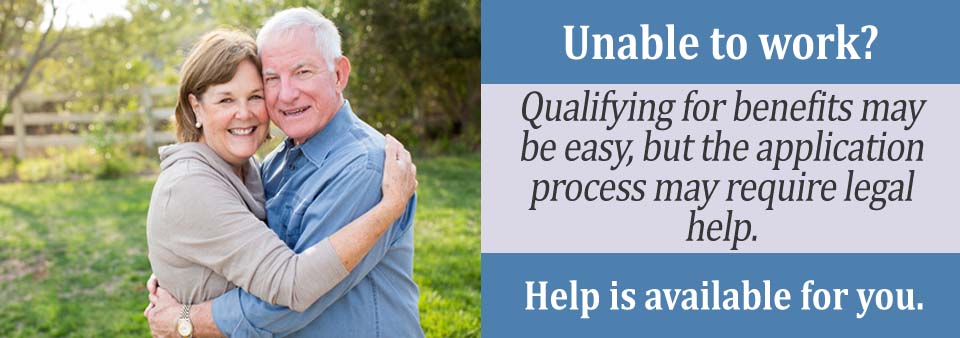How to Know if You Qualify for Disability
5 Best Ways to Know if You'll Qualify for Disability in 2021
Thousands of Americans suffer from a wide array of crippling disabilities. Thankfully, for those who require assistance, Social Security Disability Insurance (SSDI) and Supplemental Security Income (SSI) provide options to get help.
In order to be deemed disabled for SSDI or SSI services, individuals have to be disabled, whether of a physical, psychological or mental type, which prevents them from doing a significant amount of work. Moreover, the illness of a person must have prohibited the individual from doing a significant amount of work for at least 12 months or is supposed to prevent an individual from working for 12 months.
If you think Social Security Disability programs could be for you, you may want to speak with a disability attorney for an assessment or for help applying. However, before you start, here are the five best ways to determine if you may qualify.

#1: You're not earning the monthly SGA.
SGA, or substantial gainful activity, is one of the main determining factors for those applying for disability. To engage in SGA, a person must earn more than a certain amount every month to be put towards normal living expenses. For non-blind individuals, substantial gainful activity is at least $1,310/month for 2021. For blind individuals, SGA is $2,190/month.
However, low income does not inherently mean you cannot work. The SSA will evaluate the circumstances in which you preformed work. Similarly, high income does not necessarily mean that the disability claimant was doing SGA. Claimants can argue that their income would have been lower if they have evidence. Here are some examples of those circumstances:
- Needed special assistance from other personnel to perform the work
- Was permitted irregular working hours or multiple rest breaks
- Was supplied with special equipment or work particularly suitable for his or her disability
#2: You're unable to work any of your previous jobs.
Before the Social Security Administration (SSA) awards benefits, they make sure that you are incapable of earning money at any of your previous jobs. To do this, they look at your past relevant work history (PRW), which includes:
- job descriptions,
- the physical demands of your past jobs,
- the physical difficulties you experienced at these jobs, and
- the reasons why your medical condition affects your ability to perform these jobs properly.

The more your PRW can justify your current situation, the more likely you are to receive disability benefits.
A total of 20 job credits accrued in the past 15 years are generally required for Social Security Disability applicants who are over 31 years of age.
If you are younger you may qualify for Social Security Disability benefits with less job credits. It is important to bear in mind that work credits only apply to SSDI benefits. You may be eligible to apply for SSI benefits even though you have not received any work credits.

#3: You've worked recently enough to qualify.
To qualify for most Social Security benefits, you must prove that you have contributed enough money in taxes to the SSA to be considered for their programs. These contributions are called "credits", of which you can earn up to four per year.
You typically need 40 credits to be eligible for disability insurance, 20 of which obtained in the last 10 years before you became disabled. However, these number differ depending on your age — the younger you are, the less credits are required to qualify for disability insurance.
#4: You experience difficulty with day-to-day activities
When the SSA evaluates your case, they will want to know how your medical condition affects your ability to handle the activities of daily living, or ADLs. ADLs include mobility, personal hygiene, dressing, cooking, cleaning, hobbies, social interactions, or other many personal needs.
If your medical condition prevents you from living a healthy, functioning lifestyle, you may be further eligible for disability benefits.
If you are looking to apply for SSDI, it is recommended that you schedule an appointment with your physician before applying so you can address your limitations and find out whether the doctor can assist you. If you wait to schedule an appointment after you apply for disability you may decrease your chances of being approved.
Do not expect that your physician will know all of your difficulties and limitations you experience. Doctors may be less knowledgeable of their patient weaknesses than the patients themselves. Even minor restrictions can be significant when the SSA is evaluating a claim.
#5: You are a legal US resident.
Social Security benefits are and most often awarded to citizens of the United States. While some non-citizens that contribute to Social Security taxes may qualify, those who are already citizens face far fewer steps in their application process.

Contacting a Social Security Attorney
If you feel that you may qualify for disability benefits, it is wise to consult with a disability attorney. A disability attorney is an irreplaceable resource when filing out applications, keeping paperwork organized, and aiding you in the appeals process if necessary. To give yourself the best chance at receiving the assistance you deserve, speak with a disability attorney today.
- SSI and SSDI:The Differences and Similarities
- What Conditions Qualify for Disability?
How to Know if You Qualify for Disability
Source: https://www.disability-benefits-help.org/top-5/best-ways-to-qualify
0 Response to "How to Know if You Qualify for Disability"
Post a Comment